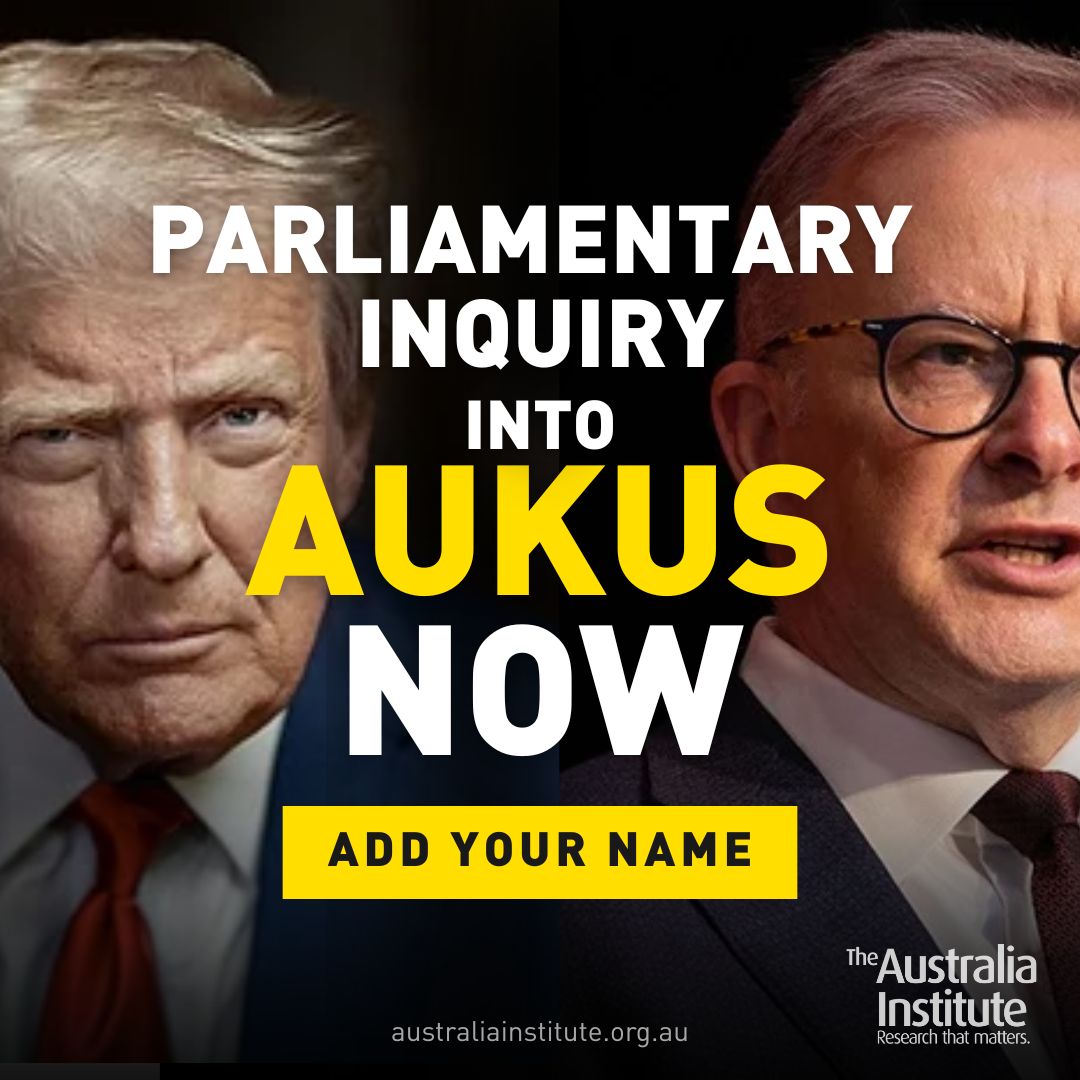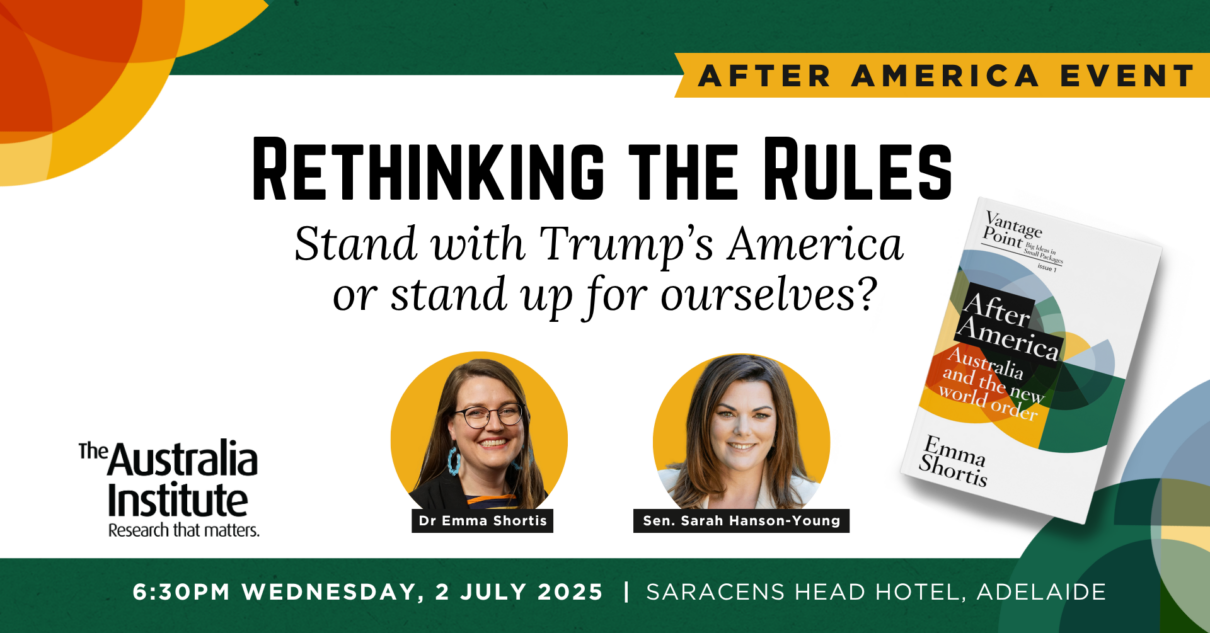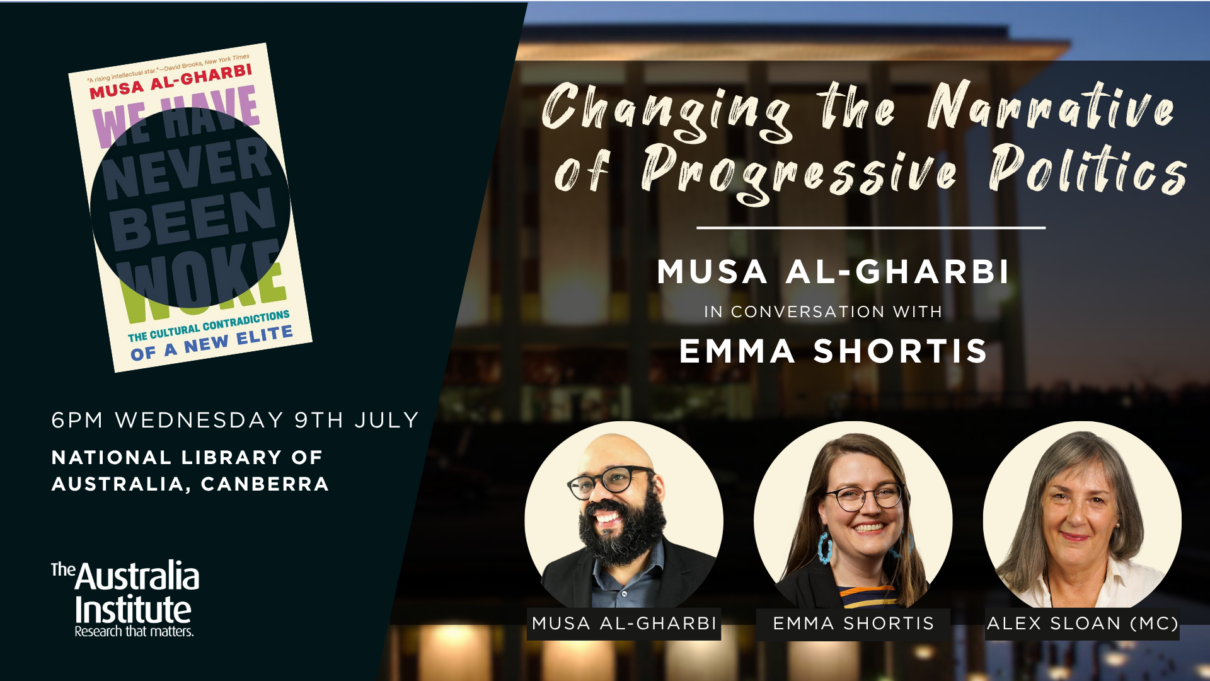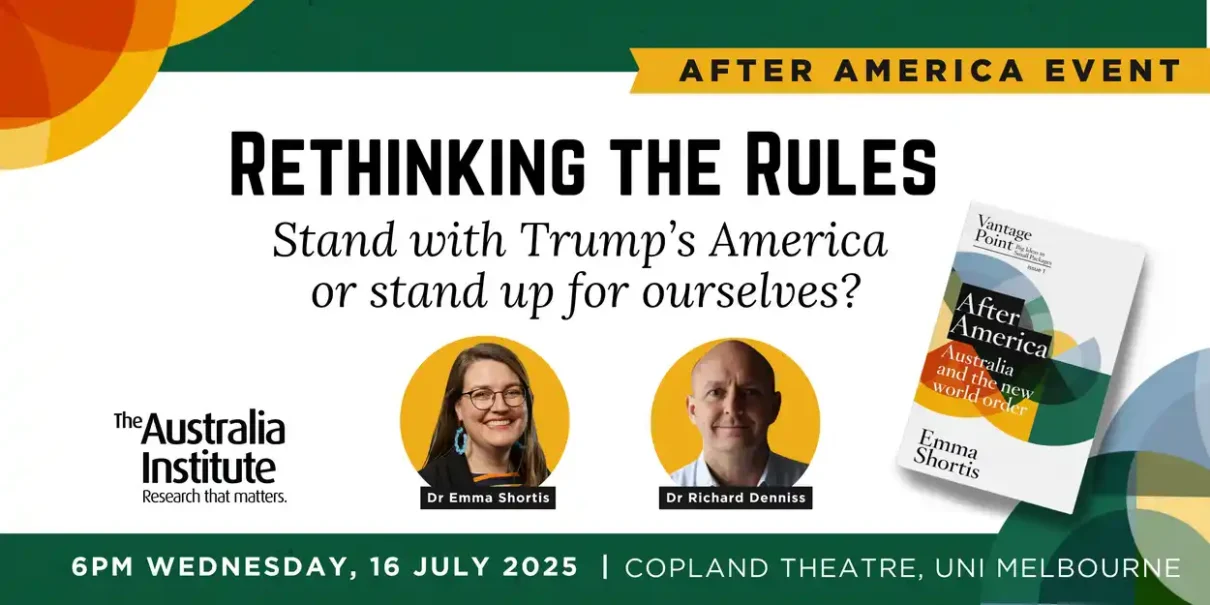The $368 billion question | Between the Lines
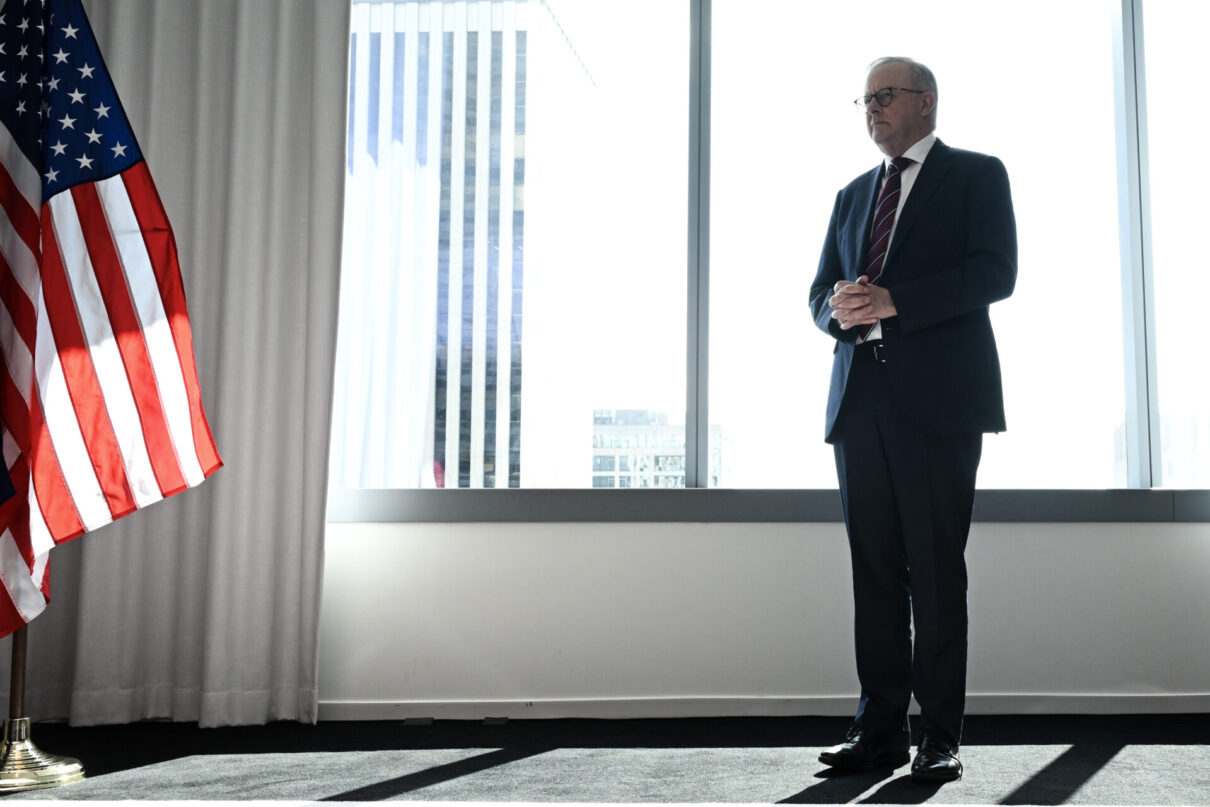
The Wrap with Dr Emma Shortis
As Taylor Swift said, if you play stupid games, you win stupid prizes.
Last week the Trump administration sent Australia’s national security establishment into a spin when it announced that it was reviewing the Aukus submarine pact to ensure that it fits Trump’s “America First” agenda.
But even before that announcement, Aukus was on shaky ground. The deal was a political stunt foisted on the Australian people with no real plan and no democratic accountability at all.
In fact, Trump’s review means that Australia – the country with the most at stake in this deal – is the only partner not to have subjected it to real scrutiny.
That’s why we’ve launched a petition calling on the Australian government to hold a parliamentary inquiry into the Aukus deal. It’s truly wild that in a democracy, a change in our security policy this big and this expensive hadn’t already been properly and publicly examined.
Thank you to the 9000 of you who have already signed. If you haven’t, please add your name:
As the Trump administration is once again on the brink of war, and as it betrays the United States’ traditional allies, it’s time we rethought our relationship with America.
The failure to review the deal, and the failure to have a Plan B in place for when it inevitably falls over, is a potentially catastrophic failure of governance.
The Australian government has a unique opportunity to review the Aukus submarine deal, and in the process, to rebalance our relationship with the United States. When American democracy desperately needs the support of its democratic allies across the world, we can refocus our relationship on what should be our “shared values” of democracy and the rule of law.
The future of our security depends on it.
— Dr Emma Shortis is the Director of the International & Security Affairs Program at the Australia Institute
The Big Stories
Government’s proposed superannuation changes are popular among voters
Treasurer Jim Chalmers’ plan to reduce the generosity of superannuation tax concessions for the wealthy is popular among voters, especially those the Liberal party says it wants to win back.
Our research found more than one in two Australians support reducing tax concessions for super balances over $3 million. The polling found 52% backed the idea, while 26% of people oppose the changes. 22% are undecided.
“That’s despite ubiquitous media coverage of the wailings of the worried wealthy,” writes Stephen Long in the New Daily. ” The media’s focus on complaints from the tiny proportion of Australians impacted – about 80,000 people – has failed to produce widespread concern among the more than 99 per cent of Australians who have less than $3 million in super.”
Our research was covered in national media including The Australian, Yahoo! Finance and news.com.au.
“Giving tax breaks to people who’ve got half a billion dollars in their self-managed super fund makes no economic sense and it doesn’t make a lot of political sense either,” said Richard Denniss.
“$3 million is an enormous amount of money to have in superannuation and all the government’s proposing is that people that are fortunate enough to have that much get slightly smaller tax concessions than they currently do.”
Cutting company tax would do nothing for productivity and would hurt ordinary Australians
The Productivity Commission is asking for submissions on cutting the company tax rate.
Company tax is a good tax because companies only pay it if they make a profit, unlike payroll tax, the GST and all the other taxes, fees and charges they pay. The latest statistics from the tax office show that 54% of companies made a loss or had zero taxable income.
Company tax cuts for the corporate sector would mean less government revenue, which would require cuts to government services for ordinary Australians or an increase in indirect tax. Both would contribute to worsening inequality.
“While the government’s terms of reference seek revenue-neutral changes, that is unlikely to stop the Business Council of Australia and big business, who never stop arguing for more money,” said David Richardson, Senior Research Fellow at The Australia Institute.
“The business groups are obliged to pretend Australia will get something in return, such as higher productivity, but that will not happen.”
Australia’s own history shows reductions in company tax rates from the high 40s to 30% now, but no real increase in investment as a share of GDP.
Company tax rate vs investment share of GDP
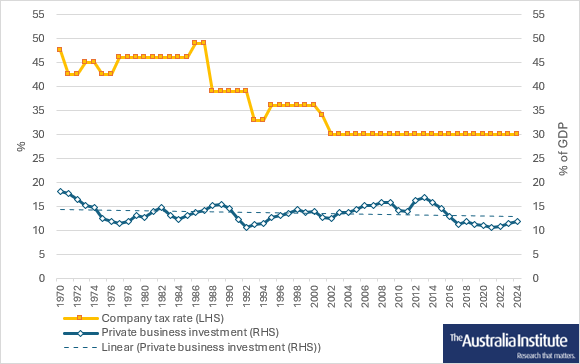
Last time we had this debate, the Coalition wanted a company tax cut from 30% to 25%. If that were done today, it would cost $83 billion over the forward estimates.
Australia has a home insurance crisis and climate change is going to make it worse
New data shows that more than 340,000 Australian households have no home insurance. A further 530,000 are underinsured, which means the insurance they have wouldn’t fully cover them if disaster struck, writes Jack Thrower in the New Daily.
Mortgages on inadequately insured homes aren’t just a risk for individual homeowners; they could destabilise the entire economy.
Between 2022 and 2023, the average home insurance premium in Australia rose by 14%, the biggest increase in a decade. A major reason for this is climate change.
Big super warned that AI is a carbon ‘time bomb’
Embracing AI without acknowledging the carbon footprint that comes with it is unacceptable, particularly for super funds which claim to be focused on the environment while also investing in tech giants including chip maker Nvidia and Microsoft, said Polly Hemming, reported in the AFR.
“The emissions AI generates are absolutely astronomical,” said Polly Hemming, speaking at the ESG Summit.
“Just because Meta or Microsoft are completely unaccountable when it comes to climate and don’t recognise the need to reduce emissions, the physics certainly does.”
“I don’t see how ESG super funds can justify investing in them.”
Vale — The Honourable Stephen Charles AO KC
The Australia Institute is saddened to hear of the passing of the Honourable Stephen Charles AO KC.
Stephen was a former judge of the Victorian Supreme Court of Appeal and member of the National Integrity Committee, which, under the auspices of The Australia Institute, made the case for effective anti-corruption commissions.
Stephen worked tirelessly toward the creation of a federal anti-corruption watchdog. He was ultimately successful when the Parliament passed the National Anti-Corruption Commission Act in 2022 – although the NACC remains restricted in its ability to hold public inquiries, an unnecessary restriction Stephen warned against in 2018.
Our thoughts are with Stephen’s family.
The Win
Australia’s parliaments closing in on gender parity
Following the recent federal election, there are now more women than ever in Australia’s nine parliaments, our analysis found.
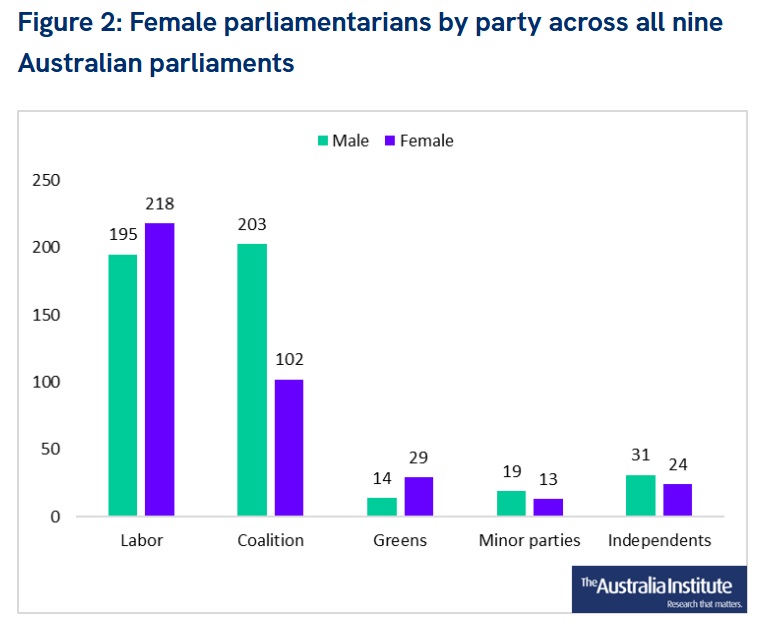
Across all Australian parliaments, 67% of Greens MPs are women, as are 53% of Labor MPs, 40% of minor party and independent MPs, and 33% of Coalition MPs.
The Bin
A new low in Australian excuses for fossil fuel expansion
A disappointing and misleading article in The Conversation suggested that Australia could become a “net-zero exporter of fossil fuels”. Yep, you read that right.
It’s scientifically baseless to suggest that exporting green energy and resources made with ‘low-emissions’ technology like ammonia or green steel cancel out the emissions from fossil fuel exports.
Podcasts
“Mugged by reality”: Australia’s AUKUS disaster with Malcolm Turnbull | After America
Australia traded sovereignty for security with the AUKUS submarine deal, but it might end up with neither.
Listen now:
The rich are getting richer | Dollars & Sense
Australia’s overly generous approach to taxing wealth is allowing the richest Australians to keep more for themselves
Listen now:
Australia doesn’t need AUKUS | Follow the Money
By reviewing the deal, Trump has given the Australian Government an opportunity to get out of the disastrous AUKUS agreement.
Listen now:
Safe to speak: protecting the whistleblower | What’s the Big Idea?
For most would-be whistleblowers, the cost of courage is way too high. A whistleblower protection authority would ease their path.
Listen now:
What’s On
After America: Rethinking the Rules | Adelaide
Each week, rapidly changing news comes out of the United States – Australia’s closest ally. From introducing sweeping tariffs to mass deportations, from leaking military actions to defunding research bodies, the consequences of the Trump administration are crashing around the world.
So what does this mean for us? Join Senator for South Australia, Sarah Hanson-Young and the Australia Institute’s Director of International & Security Affairs, Dr Emma Shortis as they explain what the current situation is and discuss what Australia can do to choose its own path towards prosperity and security.
Changing the Narrative of Progressive Politics with Musa al-Gharbi | Livestream
Register for the free livestream of this sold-out event, with Dr. Emma Shortis in conversation with renowned sociologist Musa al-Gharbi. We’ll discuss his provocative new book, We Have Never Been Woke, and how we can move beyond elite narratives to create meaningful change.
Musa al-Gharbi argues that the social justice language of ‘inclusion’ and ‘equality’ has too often been co-opted by well-educated elites and used to maintain exclusionary institutions and practices, arguing this ultimately protects the interests of the elites themselves, at the expense of the disadvantaged. This discussion is far from a cynical takedown, but rather an attempt to understand how good intentions can produce harmful outcomes – and what can be done about it.
After America: Rethinking the Rules | Melbourne
In conversation with Dr Richard Denniss, Dr Emma Shortis draws on her extensive research on the Australia/US relationship and her recent experience in North Carolina and Washington in the dying days of the 2024 presidential election campaign to explain what the current situation is and discuss what Australia can do to choose its own path towards prosperity and security.
After America: Australia and the New World Order will be available for purchase at the event, with a book signing from 7:00 pm after the event finishes. You can also buy a copy in advance via The Australia Institute website.
Between the Lines Newsletter
The biggest stories and the best analysis from the team at the Australia Institute, delivered to your inbox every fortnight.
